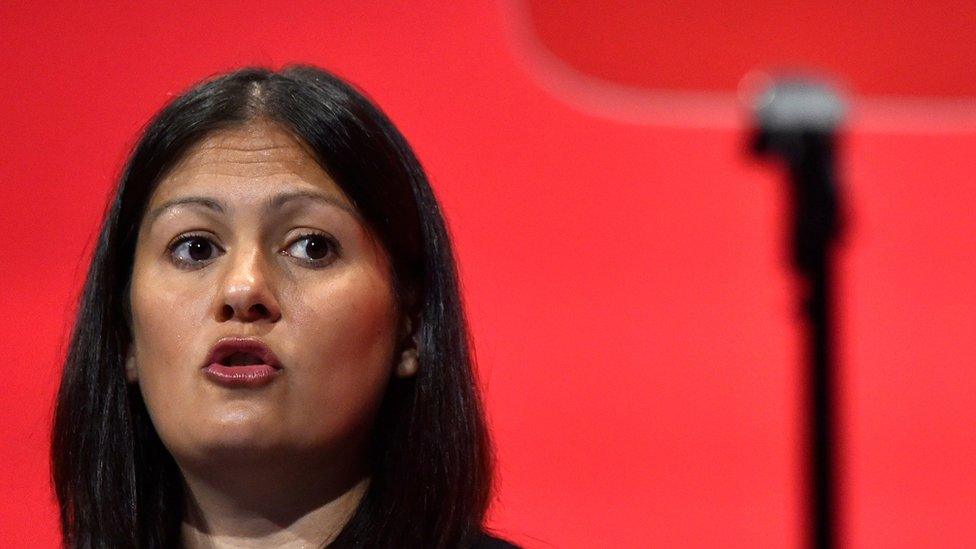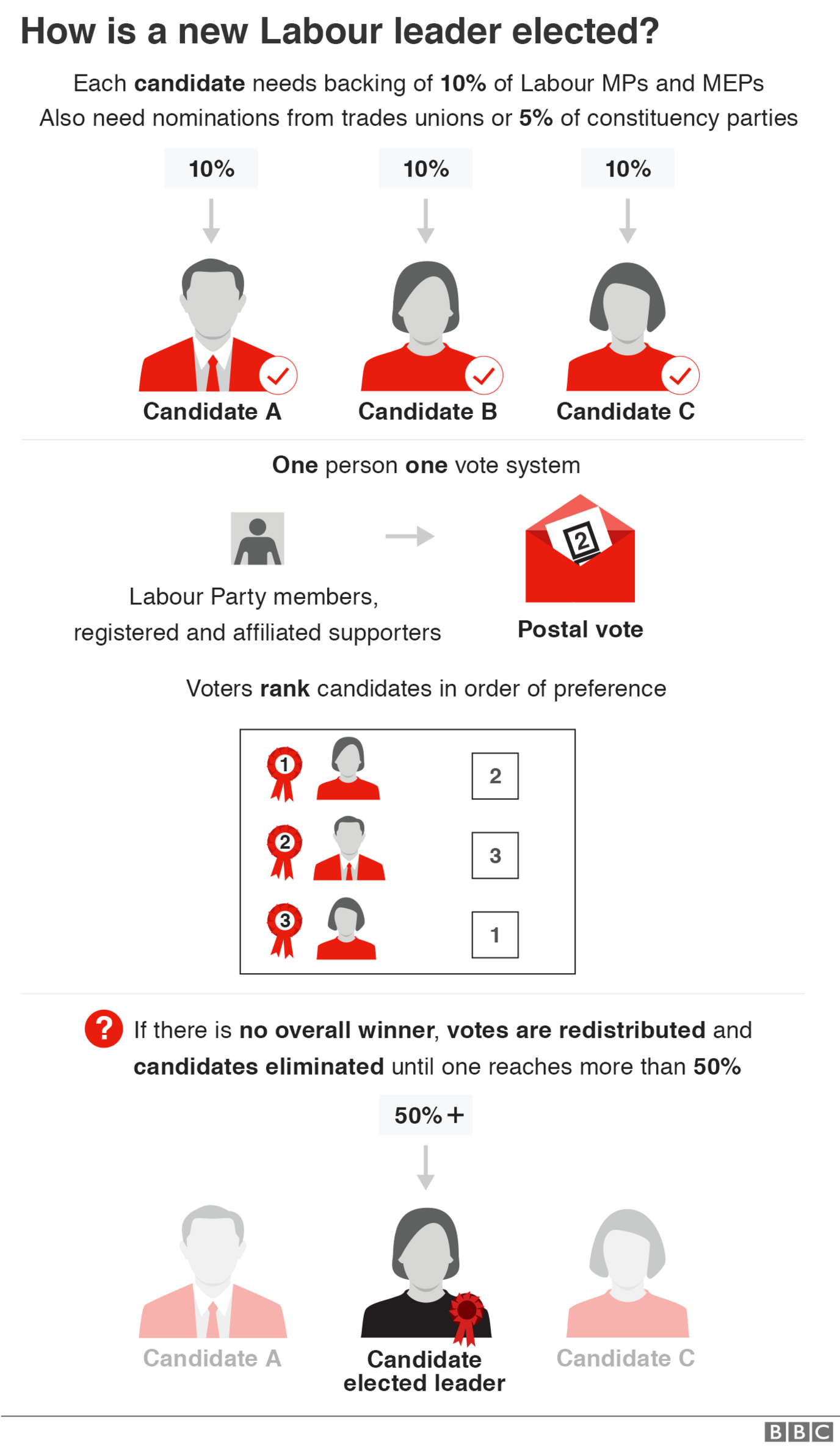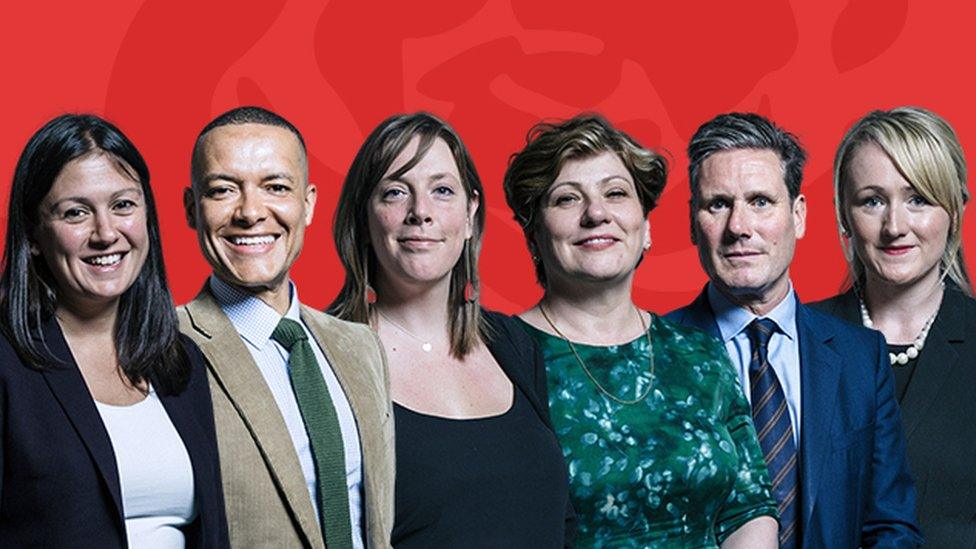Labour leadership: Lisa Nandy joins race to replace Jeremy Corbyn
- Published

Wigan MP Lisa Nandy has announced she is joining the race to replace Jeremy Corbyn as Labour leader.
In a letter to the Wigan Post, external, she said she wanted to "bring Labour home" to voters that have abandoned the party in its traditional strongholds.
Her announcement came on the same day Birmingham Yardley MP Jess Phillips announced she was joining the race.
Shadow foreign secretary Emily Thornberry and shadow treasury minister Clive Lewis are also both standing.
Shadow Brexit secretary Sir Keir Starmer and shadow business secretary Rebecca Long-Bailey are among those also expected to stand.
A timetable for the leadership election - and any rule changes - is set to be decided by the party's ruling National Executive Committee (NEC) on Monday.
The contest was called because Mr Corbyn is standing down as leader following the party's heavy election defeat.
Ms Nandy said the "political earthquake" seen after the general election result had highlighted the need for a different approach within the party.
She told BBC Breakfast: "People have been telling us for some time that we can't just keeping changing the man at the top, and determining the priorities and the solutions to the problems that they face from behind a desk in Victoria Street, Westminster or Whitehall."
She said she had a "duty" to provide a "different sort of leadership" for voters who wanted an end to political parties' "paternalistic approach" and to take back "control" over their own lives.
She added: "I have the duty to stand up for those people and see if Labour can become a national force again, rooted in our communities and capable of speaking with and for those people."
She said the next Labour leader would also have to put a stop to the "factions" and "in-fighting" within the party to "earn back" the trust of voters.
"[They] will [have to] show people that we've changed, that we're kind and compassionate towards one another...that we have zero tolerance on issues like anti-Semitism and when we say that we believe in a more equal, compassionate society that we are walking the walk within our own party, not just talking the talk."


Lisa Nandy chose an unconventional way to launch her campaign - an open letter to constituents in her local paper.
In a challenge to London-based candidates such as Emily Thornberry and Keir Starmer, who will declare his candidacy soon, Ms Nandy argued that the next Labour leader should come from a community like hers.
She said she agreed with the perception that many political leaders were "unable or unwilling" to understand places such as Wigan - and that her party must elect, in her words, someone who has "skin in the game".
She also pledged not to indulge in faction-fighting. In her pitch to succeed Mr Corbyn, she said the response to anti-Semitism had been "woeful".
She promised to challenge Boris Johnson with "passion and precision" and argued that the best way for Labour to win back lost voters was by being "brave and bold" rather than "trying to look all ways".

Ms Nandy has represented the safe Labour constituency of Wigan since entering Parliament after the 2010 general election.
She served as shadow energy secretary during the first year of Mr Corbyn's leadership, but was among a clutch of shadow ministers to quit their posts in 2016 following the Brexit referendum.
She advocated remaining in the EU during the referendum campaign, but voted for the PM's Brexit deal in October and has argued the party's pledge to hold another referendum after renegotiating the deal alienated voters in Leave-supporting areas.
She has been urging her party to concentrate on winning support in smaller towns, and suggested it should move its headquarters outside London.
Ms Nandy's announcement comes after Jess Phillips joined the leadership race on Friday, stating that "something has to change" and "more honesty" in politics was required.
Jess Phillips: Labour members are "ready to try something different".
Ms Phillips, a vocal critic of Mr Corbyn's leadership, acknowledged the campaign "won't necessarily be an easy fight" for her, but said she thought Labour members were "ready to try something different".
The Birmingham Yardley MP added that Labour needed a leader who would "truly speak truth to power" and be able to "take on" Mr Johnson.
There will also be an election for a new deputy leader, with shadow justice secretary Richard Burgon, shadow equalities minister Dawn Butler and shadow Europe minister Khalid Mahmood confirming they intend to run.
Shadow education secretary Angela Rayner has also received the backing of Ms Long-Bailey for the deputy post.
Under current rules, would-be candidates for both the leader and deputy leader roles must first be nominated by more than 20 MPs.
They must also secure nominations from at least 5% of Labour's constituency parties or three affiliated bodies - two of which must be trade unions.


- Published3 January 2020
